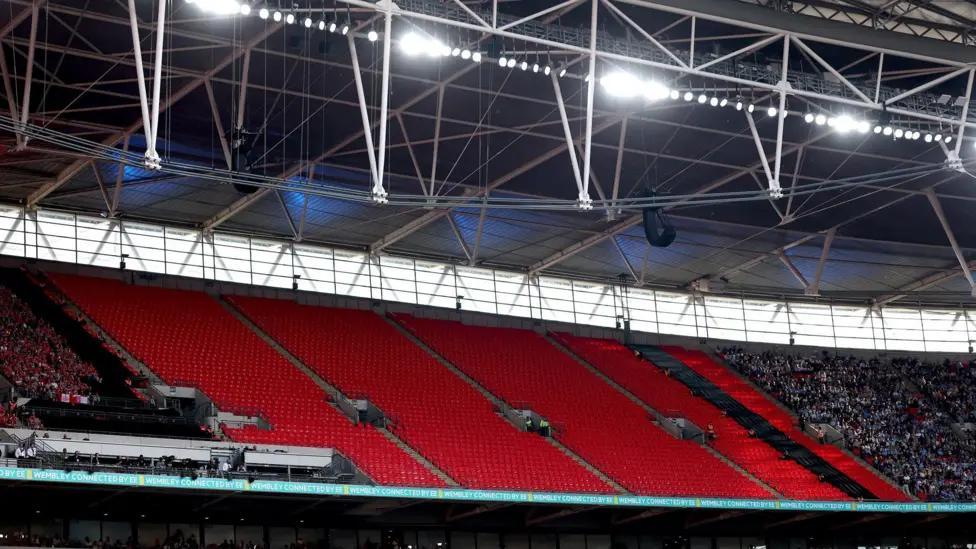Africa-Press – Lesotho. Manchester City reached their third consecutive FA Cup final by beating Nottingham Forest on Sunday, but the semi-final was played against a backdrop of thousands of empty seats in the blue half of Wembley.
Pep Guardiola’s side have enjoyed an incredible period of success and the club and supporters will travel down to the national stadium as a neutral venue for the 29th time since it was refurbished in 2007, when they face Crystal Palace on 17 May.
So are City victims of their own success with fans suffering from ‘Wembley fatigue’, and would a change of venue for the semi-finals of the world’s oldest club competition help?
What was the ticketing breakdown?
Manchester City have made Wembley their second home since beating rivals Manchester United in the 2011 FA Cup semi-finals, before edging past Stoke courtesy of Yaya Toure’s winner in the final which laid the foundations for the trophy-laden years that have followed.
But the frequent trips from Manchester to London appear to have taken their toll, with an attendance of 72,976 for Sunday’s game at the 90,000-capacity stadium.
This was City’s seventh consecutive semi-final appearance but – aside from the Covid years when matches were played behind closed doors – there have been occasions during that run when the attendance was lower, in 2023 against Sheffield United (69,603) and Brighton in 2019 (71,521).
The ticket-sales breakdown for the four semi-finalists this year were approximately:
Nottingham Forest – 36,000
Crystal Palace – 35,500
Aston Villa – 34,000
Manchester City – 27,000
Factors such as Nottingham Forest having a remarkable season, Crystal Palace being based in London and Aston Villa’s buoyant team chasing silverware under Unai Emery can be taken into consideration for those numbers.
Reaching Wembley does not happen too often for most clubs and supporters relish a possible once-in-a-lifetime day out there.
One scenario would be to give the tickets away, but there is a balance to be struck between keeping them on sale until the last minute for fans to purchase them, against the idea of distributing them among people in the local area for free.
The logistics of doing that in such a short space of time are not straightforward.
‘A financial choice’
Manchester City supporters have pointed out the price of tickets, ranging from £30 to £150, the cost of travel down to London, buying food and drink and a Sunday kick-off at 16:30 BST as the major factors for the number of empty seats.
Kevin Parker, general secretary of City’s official supporters’ club, told BBC Sport: “It is an expensive day out and when you have done it 25 or 30 times, there are decisions you have to take in terms of the cost.
“Our record in the FA Cup under Guardiola has been unbelievable, but fans – without disrespect to Nottingham Forest – are hoping to be reasonably confident we will play in the final. Those games are only three weeks apart. People do have to make a financial choice.”
Those who were in attendance joyously celebrated victory with their ‘Poznan’ dance, while Guardiola took the adulation of the travelling supporters.
“You could see the passion within the supporters after beating Nottingham Forest, but ‘Wembley fatigue’ is a good way of describing how we feel about the day,” says Parker.
“It is a long day for travel, the additional expense and having work or school the next day. It is inconvenient to play at 4:30pm on a Sunday.”
Some City fans are planning further protests during the Premier League game against Wolves at Etihad Stadium on Friday over what they say is the club’s refusal to increase the number of season-ticket holders.
But Parker said the non-sale of tickets for the semi-final was “not a fan protest” and the empty seats had “nothing to do with that”.
The official supporters’ group has 400 branches worldwide and Parker said it already had ticket applications from places such as Thailand, Iraq, Australia and the United States for the final.
For More News And Analysis About Lesotho Follow Africa-Press






